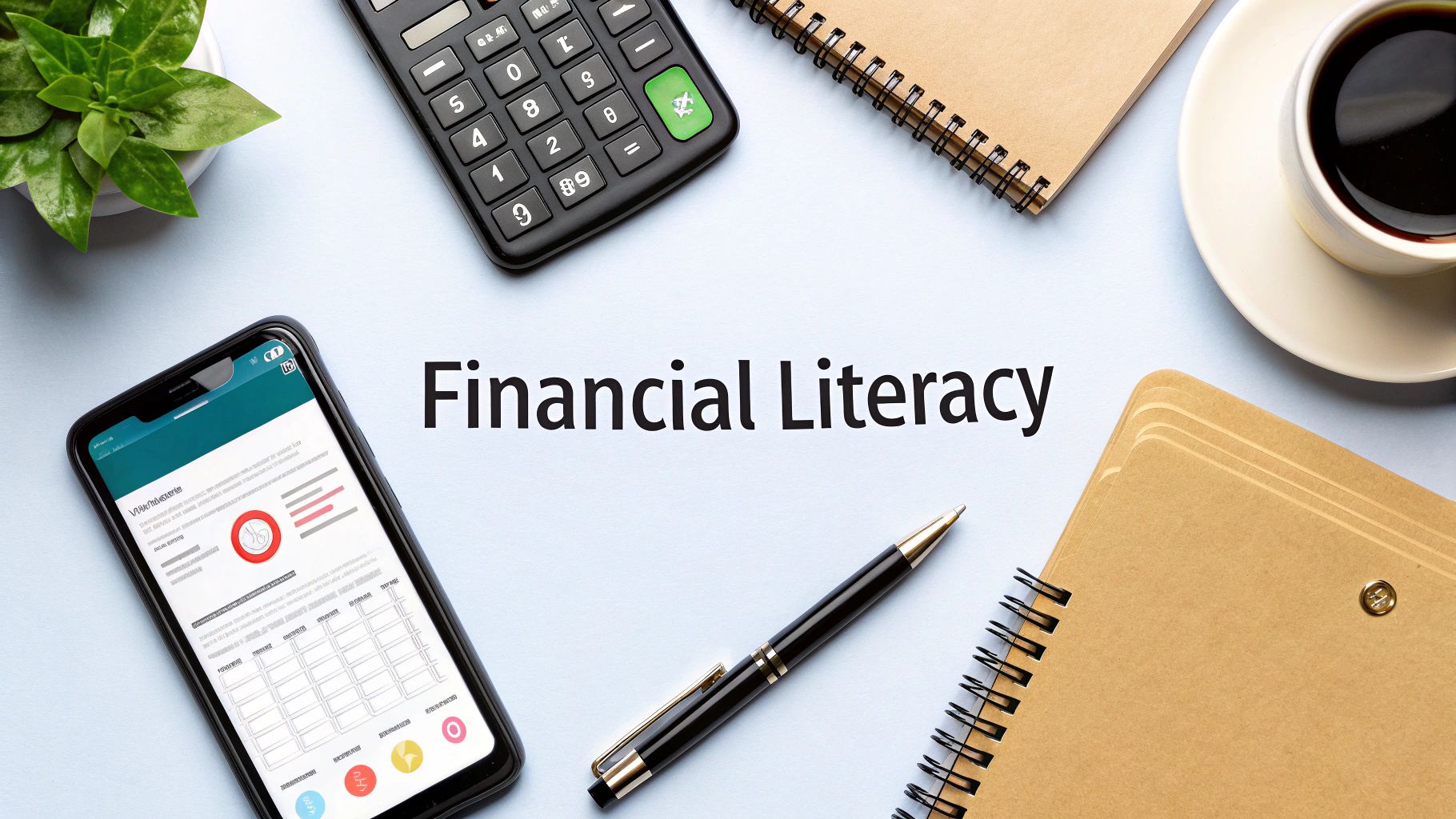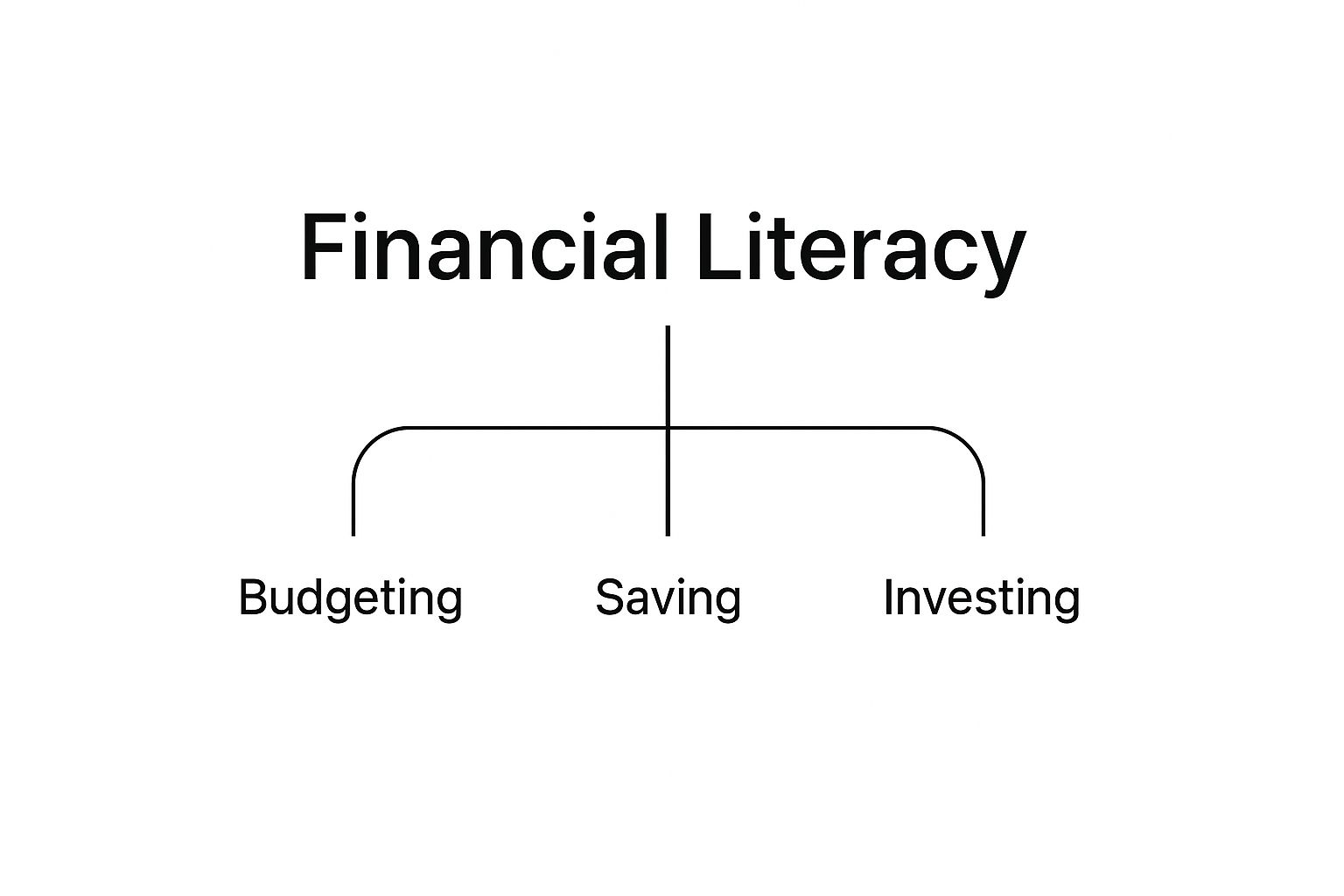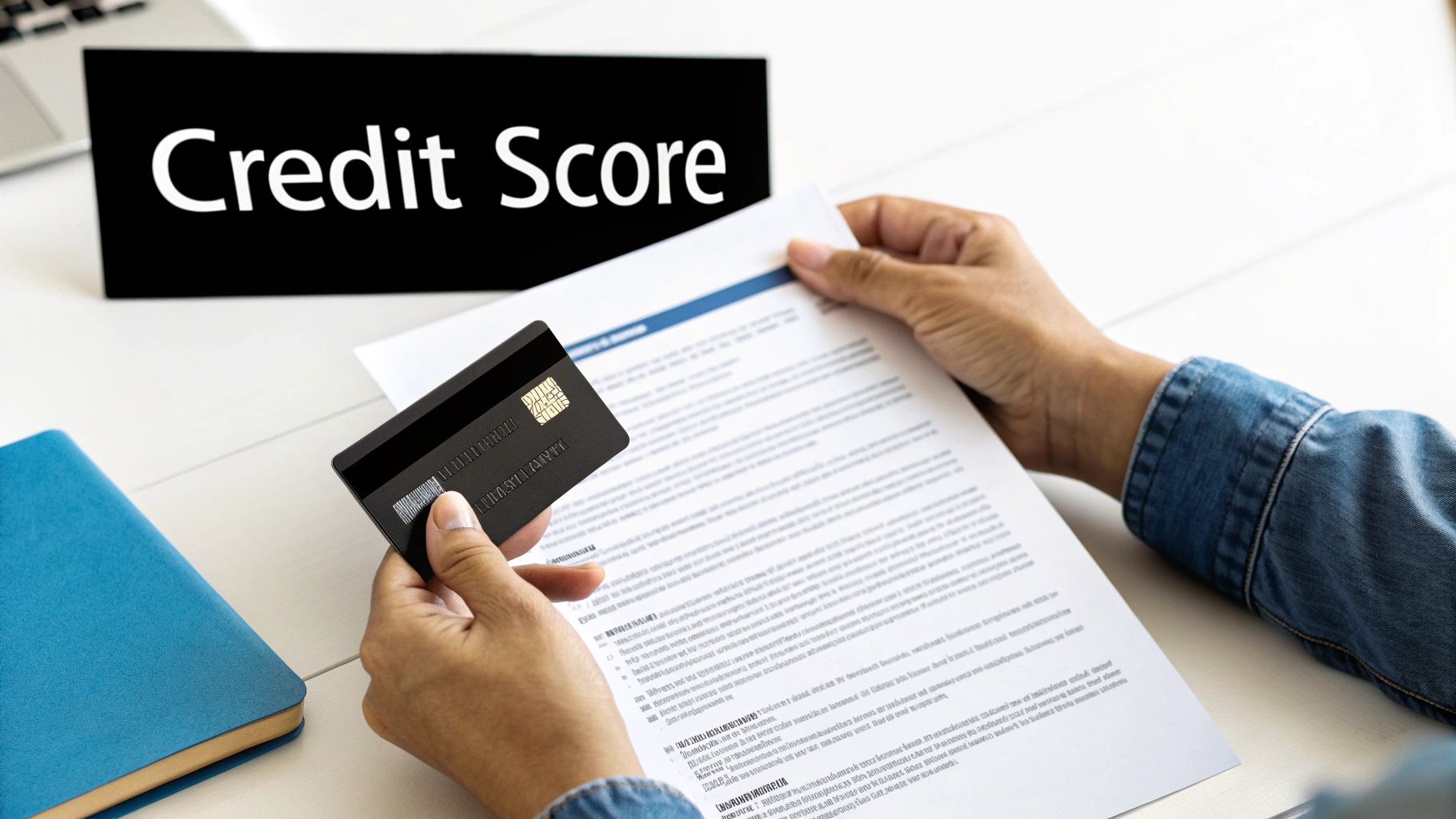What Is Financial Literacy? Your Essential Guide to Financial Success

Financial literacy isn't some complex, abstract theory—it's the practical skill of knowing how to manage your money effectively. Think of it as having the confidence to make smart financial choices, whether that means mapping out a weekly budget or planning for a goal years down the road, like retirement.
Ultimately, it’s about real-world competence, not memorizing textbook definitions.
Understanding What Financial Literacy Really Means
Imagine trying to drive in a new city without a map or GPS. You might eventually get where you're going, but it would be stressful, inefficient, and full of wrong turns. That’s what managing your finances without financial literacy feels like. You’re just guessing, hoping for the best.
Financial literacy is your roadmap. It gives you the power to steer your money with purpose, helping you dodge common roadblocks and drive straight toward your goals.
This isn't some secret knowledge reserved for Wall Street traders or accountants; it’s a crucial life skill for every single person. It helps you build a stable future, cut down on money-related stress, and spot opportunities when they appear. For ITIN holders, getting a firm grip on these principles is especially important for navigating the U.S. financial system and building a solid foundation.
The Core Components
At its core, financial literacy boils down to a few key areas of knowledge. This infographic gives a great visual of how its foundational pillars connect.

To put it simply, getting comfortable with concepts like budgeting, saving, and investing gives you the framework you need to make sound financial decisions.
Let's break down these fundamental components. They're often called the "four pillars" because they form the foundation of a healthy financial life.
The Four Pillars of Financial Literacy
When you master these four areas, you're not just managing money—you're building wealth and security for the long term.
Unfortunately, this essential skill set isn't as widespread as it should be. A staggering 3.5 billion people worldwide lack basic financial knowledge, with only about 33% of adults considered financially literate. While some countries, like Denmark and Sweden, have much higher rates around 71%, it's clear there’s a massive global gap in financial education.
Building this knowledge is a journey, not a race. It starts with the basics, like creating a simple budget, and gradually expands to cover more advanced topics like investing and understanding the different factors that can influence your finances. A great first step is to learn the basics of what a credit score is and why it’s so important.
Mastering the Core Skills of Money Management

Knowing the definition of financial literacy is one thing, but real confidence comes from putting it into practice. These core skills aren't abstract theories; they're the everyday habits that give you direct control over your financial life.
I like to think of these skills as instruments in an orchestra. Each one is useful on its own, but when they work in harmony, they create something truly powerful. The three most important skills are budgeting, saving and investing, and managing debt and credit.
Budgeting: Your Blueprint for Success
People often see a budget as a restrictive diet for their money, but that’s not it at all. A budget is a tool for freedom. It’s your personal plan for telling your money exactly where to go, making sure your spending actually lines up with what you want out of life.
Creating a budget is as simple as tracking what comes in and what goes out. That clarity alone is powerful—it shows you where you can cut back, where you can find extra money to save, and how to make smarter decisions. Finding ways to simplify your bill payments with auto-pay can also make a huge difference in keeping things organized and stress-free.
Saving and Investing: For Now and Later
Once your budget is humming along, you can start putting your money to work. Saving and investing are two sides of the same coin, each with a specific and equally important job.
This two-pronged approach makes sure you're ready for anything life throws at you today while also building a more secure tomorrow.
Understanding Debt and Credit
Finally, getting a handle on debt and credit is non-negotiable, especially for ITIN holders trying to build a financial identity in the U.S. Not all debt is bad—a mortgage can be a powerful asset-builder. But high-interest debt, like a revolving credit card balance, can quickly drag you down.
Your credit score acts as a report card for your financial health, affecting everything from whether you get a loan to the interest rate you pay. Managing it well means paying bills on time, keeping your balances low, and understanding the rules of the game.
For instance, learning about what a credit utilization ratio is and keeping it in check is one of the quickest ways to improve your credit standing. For anyone with an ITIN, a strong credit profile is the key that unlocks better financial products and opportunities.
The Real-World Benefits of Financial Wellness

Knowing the definition of financial literacy is one thing, but the real magic happens when you start putting that knowledge to work. Think of it less like an academic subject and more like a practical tool that can genuinely improve your everyday life. The first thing most people notice? A huge drop in money-related stress.
When you have a solid handle on your finances, you’re no longer blindsided by an unexpected car repair or scrambling at the end of the month. That constant worry is replaced with a sense of control, giving you the confidence to chase bigger dreams—like buying a home, launching a business, or actually looking forward to retirement.
On top of that, financial know-how is your best defense against predatory loans and scams designed to trap people who are in the dark about their options.
From Surviving to Thriving
Imagine two people earning the exact same salary. One is stuck in a cycle of living paycheck to paycheck, weighed down by debt and anxiety. The other, equipped with financial skills, is steadily saving, investing, and building a secure future. Their incomes are identical, but their financial realities couldn't be more different.
That’s the power of financial literacy in a nutshell. It’s the bridge that takes you from just getting by to actually getting ahead. It’s not just about managing money; it’s about creating options for yourself and your family.
By mastering these skills, you’re doing more than just improving your own bank account. You’re building a foundation for generational wealth and giving your family a financial head start that can last for years.
A Practical Guide for ITIN Holders

For anyone with an Individual Taxpayer Identification Number (ITIN), financial literacy isn't just a good idea—it’s a survival guide. You're navigating a financial world with unique obstacles that many others don't face, like getting a bank account or building credit without a Social Security Number (SSN).
This is where having the right knowledge makes all the difference. Knowing which banks and credit unions are ITIN-friendly, for instance, can spare you a lot of wasted time and headaches. It’s the first real step toward putting down financial roots in the U.S.
The biggest hurdle for most is building credit from zero. It can feel like a catch-22; you can't get a loan for a car or home without credit, but how do you get credit in the first place?
Strategies for Building Credit with an ITIN
Thankfully, there are proven ways for ITIN holders to build a solid credit profile. Think of these as your on-ramp to the U.S. credit system, designed to show lenders you're a reliable borrower.
A secured credit card is a fantastic starting point. You'll make a small cash deposit, which then becomes your credit limit. Use it for small, everyday purchases and—this is the important part—pay the bill on time, every time. This positive activity gets reported to the credit bureaus and starts building your history.
Another great tool is a credit-builder loan. It works a bit differently than a traditional loan. You make regular payments to a lender, who holds the money in a savings account for you. Once you’ve paid the full amount, the money is yours, and you walk away with a history of on-time payments on your credit report.
These actions matter because they add up on your credit report. It’s a good idea to periodically check your ITIN number credit report to see your progress and make sure everything is accurate. By taking these steps, your ITIN becomes more than just a tax ID—it becomes a key to your financial future.
Your First Steps on the Path to Financial Confidence
Ready to turn all this talk into action? Getting started on your journey to financial literacy isn't about taking some massive, intimidating leap. It’s about a few small, deliberate steps that build on each other. Remember, the goal here is progress, not perfection.
First things first: you need a clear, honest snapshot of where you are right now. Start by calculating your net worth—simply what you own minus what you owe. Then, for one month, track every dollar you spend. Don't judge yourself or change your habits just yet. The simple act of observing where your money goes is the bedrock of taking back control.
It turns out a lot of people are catching on to this. Around 45% of Americans are now using tools like budgeting apps and spreadsheets to get a handle on their finances, showing a real shift toward wanting that clarity. You can see more stats on this trend over at Carry.com.
Create a Simple Plan
Once you have that full picture, you can start making a plan. You don't need anything complicated; a fantastic starting point for beginners is the 50/30/20 rule.
Think of this less as a rigid set of rules and more as a helpful guide. It’s designed to help you make more intentional decisions with your money.
Finally, give yourself a small, achievable win. Your first mission? Build a $500 emergency fund. This single step does two amazing things: it gives you a crucial safety net and delivers a powerful psychological boost. It's proof that you can take charge of your financial future.
Once you feel comfortable with these basics, you'll be ready for the next big step. To learn more, check out a complete guide on how to start investing for beginners and start building those skills.
Got Questions About Financial Literacy? We've Got Answers.
Jumping into the world of personal finance can feel overwhelming, and it’s completely normal to have a ton of questions. Let’s tackle a couple of the most common ones to clear things up and get you started on the right foot.
How Long Does It Take To Become Financially Literate?
This is probably the number one question I hear, and the honest answer is: it’s an ongoing process. Think of it less like a course you finish and more like a skill you develop over a lifetime.
You can definitely get a solid handle on the fundamentals—like creating a budget that actually works or opening a savings account—in just a few months. But true financial confidence comes from adapting those skills to whatever life throws at you. Buying a car, starting a family, planning for retirement... each new milestone is a chance to learn and grow your financial know-how.
Where Can I Find Trustworthy Financial Advice?
With so much noise online, figuring out who to listen to is a huge challenge. While you’ll find endless "gurus" on social media, their advice can be unreliable or even risky. It's always better to stick with proven, unbiased sources.
A great place to start is with government-backed resources like the Consumer Financial Protection Bureau (CFPB). Non-profit credit counseling agencies are also fantastic, offering guidance without trying to sell you something. For news and analysis, look to established financial publications that have a long track record of solid reporting.
Ready to take control of your financial future? With itin score, you can get free, unlimited access to your credit report and a personalized action plan designed for ITIN holders. Sign up in minutes and start building your credit today!